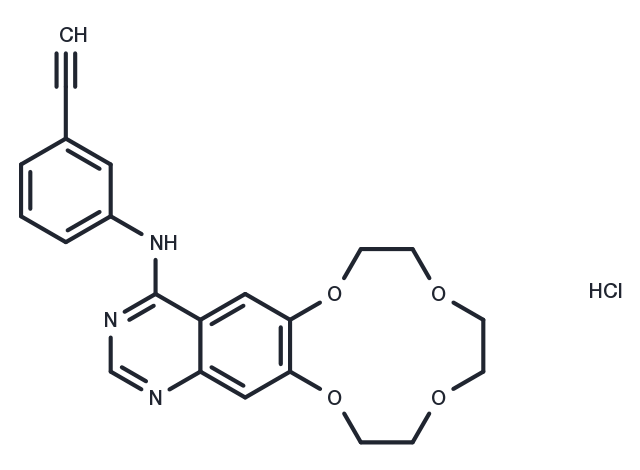Powder: -20°C for 3 years | In solvent: -80°C for 1 year


Icotinib Hydrochloride (BPI-2009H) is the hydrochloride salt form of icotinib, an orally available quinazoline-based inhibitor of EGFR, with potential antineoplastic activity. Icotinib selectively inhibits the wild-type and several mutated forms of EGFR tyrosine kinase. This may lead to an inhibition of EGFR-mediated signal transduction and may inhibit cancer cell proliferation. EGFR, a receptor tyrosine kinase, has been upregulated in a variety of cancer cell types.

| Pack Size | Availability | Price/USD | Quantity |
|---|---|---|---|
| 5 mg | In stock | $ 55.00 | |
| 10 mg | In stock | $ 80.00 | |
| 25 mg | In stock | $ 143.00 | |
| 50 mg | In stock | $ 239.00 | |
| 100 mg | In stock | $ 355.00 | |
| 200 mg | In stock | $ 527.00 | |
| 1 mL * 10 mM (in DMSO) | In stock | $ 61.00 |


| Description | Icotinib Hydrochloride (BPI-2009H) is the hydrochloride salt form of icotinib, an orally available quinazoline-based inhibitor of EGFR, with potential antineoplastic activity. Icotinib selectively inhibits the wild-type and several mutated forms of EGFR tyrosine kinase. This may lead to an inhibition of EGFR-mediated signal transduction and may inhibit cancer cell proliferation. EGFR, a receptor tyrosine kinase, has been upregulated in a variety of cancer cell types. |
| Targets&IC50 | EGFR:5 nM |
| Synonyms | BPI-2009H |
| Molecular Weight | 427.88 |
| Formula | C22H22ClN3O4 |
| CAS No. | 1204313-51-8 |
Powder: -20°C for 3 years | In solvent: -80°C for 1 year
DMSO: 12 mg/mL (28.04 mM)
You can also refer to dose conversion for different animals. More
bottom
Please see Inhibitor Handling Instructions for more frequently ask questions. Topics include: how to prepare stock solutions, how to store products, and cautions on cell-based assays & animal experiments, etc.
Icotinib Hydrochloride 1204313-51-8 Angiogenesis JAK/STAT signaling Tyrosine Kinase/Adaptors EGFR Epidermal growth factor receptor HER1 Inhibitor BPI-2009H ErbB-1 Icotinib inhibit inhibitor
